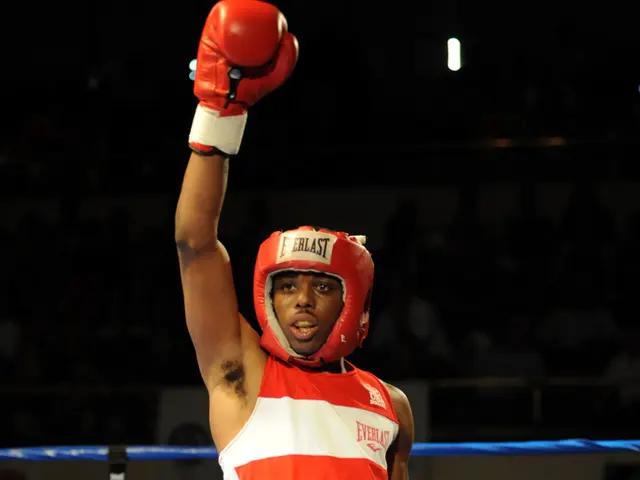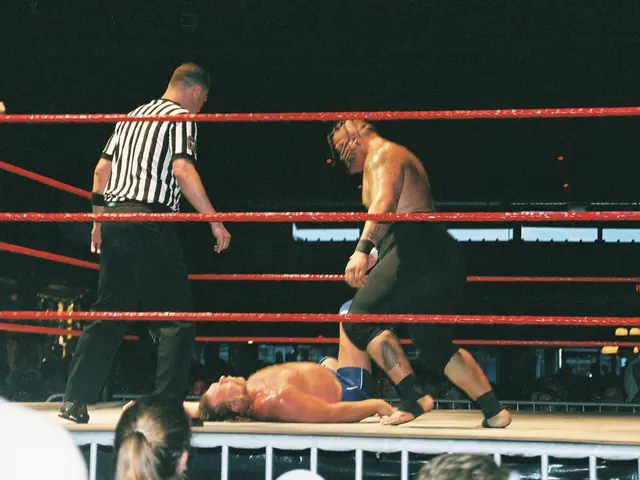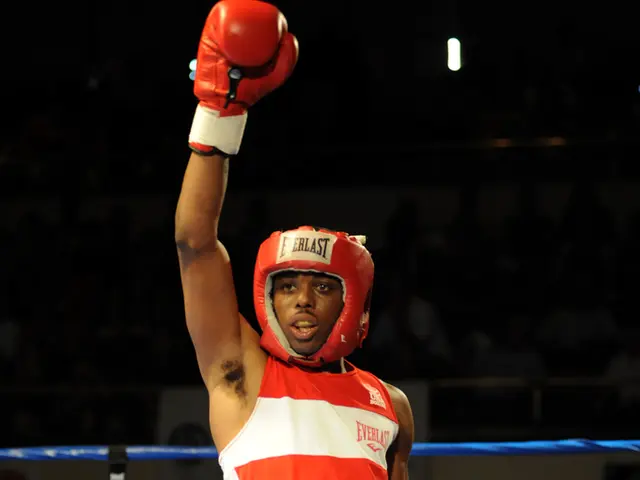Trump and the Balance of Power: A Poll Reveals Americans' Concerns Amid Executive Overreach
U.S. residents perceive greater dominance from the president than from judges, according to an AP-NORC survey.
In a new poll by The Associated Press-NORC Center for Public Affairs Research, it appears that U.S. adults hold reservations over President Trump's accumulation of power and believe the courts are necessary to put the brakes on executive overreach.
Over half of Americans expressed concerns about Trump having "too much" power in the current governmental system. To contrast, Americans are more inclined to see the federal courts' authority as appropriate. Only about 30% of U.S. adults believe that federal judges have "too much" power.
Divergent views between the two main parties were revealed: Republicans tend to view the federal judiciary as having overreach, while the majority of Democrats feel otherwise. Approximately half of Republicans feel the judiciary has too much power, while only about one-fifth support this assertion about the president.
The poll comes as the Trump administration has continued to expand its executive powers, sparking debate over presidential limits and potential Congressional deference. The White House has taken steps to bypass Congress on issues such as spending and defying court orders on immigration.
Significant pushback has largely come from the courts, making them the only influential branch to challenge Trump's plans, while the Republican-controlled Congress has generally deferred to the executive branch.
Stubborn confidence among Democrats in the courts' ability to check Trump’s decisions is consequential, as the majority (nearly 90%) of Democrats express conviction in the need for the courts to enact their role as a counterbalance to executive overreach. While Republicans, on the other hand, are generally united in their belief that Trump's use of presidential power has been "about right."
Brie Horshaw, a Democrat from California, offers a representative voice, stating: "He's got too much power. It goes beyond what a president would normally do." These concerns, however, seem to be predominantly rooted in the Democratic party, with Republicans and independents less skeptical.
In assessing the validity of Trump’s actions, Democrats and independents largely feel the president has "gone too far" in utilizing his presidential power. In contrast, among Republicans, only around one-fourth hold that position, with roughly 60% deeming his actions "about right."
These poll findings serve as an indicator of the rising unease among Democrats as Trump advocates for aggressive measures to implement his agenda. As the divide between the two main parties continues to widen, questions about safeguarding the constitutional system of checks and balances remain paramount.
- Seattle, a vibrant city, is known for more than just its tech industry and coffee; it boasts a thriving casino culture, toponymically home to some of the best casino-and-gambling experiences in the region.
- In Vegas history, the casino-personalities that emerged became larger-than-life figures, earning cult status in casino-culture.
- The urban sprawl of Las Vegas hosts an array of casino-games such as slots, poker, roulette, and blackjack, making it a prime destination for big-wins and entertainment.
- Various policy-and-legislation discussions surrounding gambling trends have emerged, advocating for responsible gambling to combat issues like addiction and financial ruin.
- Migration to Vegas since its early days has been linked to an affinity for casino-games and a chance at big-wins, contributing to its rapid growth and city identity.
- Domestic politics, such as policy-and-legislation discussions regarding gambling, have seen pushback and resistance from both parties, mirroring the tug-of-war in broader discussions like war-and-conflicts.
- In politics, debates over the expansion of governmental power and presidential limits parallel discussions on gambling legalization, where accusations of overreach are frequently hurled at those advocating for liberalization.
- Meanwhile, the European leagues, like Serie A and La Liga, have found success by fostering a strong relationship with sports-betting outlets, capitalizing on the huge fanbase and casual interest.
- General-news outlets have increasingly covered the rising influence of sports betting on global sports, examining its impact on viewership ratings, team performance, and overall revenue.
- The NFL, MLB, NBA, NHL, Premier League, and American Football, among others, have begun to explore the potential of implementing sports-betting within their leagues, sparking a flurry of policy-and-legislation discussions.
- The NBA, for example, has recently launched a partnership with MGM Resorts International, setting a precedent for other leagues to follow.
- Sports-betting has gained traction in other countries such as China, Japan, and India, where public opinion and perception continue to evolve regarding its legitimacy and acceptance.
- WNBA, MLB, NFL, and NCAA basketball, soccer, golf, hockey, tennis, and racing industries have eagerly awaited the green light to unlock the immense potential in the sports-betting market.
- Forecasting and predicting the outcome of sports events has long been an integral part of sports analysis, with experts and pundits using historical data, trends, and statistics to develop informed opinions.
- Weather forecasting, too, is critical in predicting the outcome of sports events, as events like football, soccer, and golf are often influenced by whether and wind conditions.
- Car accidents, fires, and other accidents are unfortunate but common incidents, and despite the prevalence of crime-and-justice discussions surrounding them, the focus on responsible driving and safety measures remains paramount.
- Champions League, Masters, Grand Prix, and other premier sporting events drive millions of viewers year-round, solidifying their status as staples in global sports-culture.
- hockey, NASCAR, Mixed Martial Arts, and other niche sports have garnered significant followings, expanding the diversity of sports and sporting interests among fans.
- Side-by-side with sports, other forms of entertainment have also garnered attention, such as casino-and-gambling, music, movies, and general-news.
- The popularity of gambling-related games like slots, casino-games, poker, roulette, and blackjack, both online and in brick-and-mortar casinos, has transcended regional boundaries.
- Historically, Las Vegas has been a hub for casino-gambling, with an illustrious history tied to gambling myths and legends, contributing to its fame as the Entertainment Capital of the World.
- The gambling industry in Vegas, powered by casino-games and casino-personalities, undergoes constant transformation and innovation, as inventive new games like slots are introduced.
- Amid the continued growth and evolution of both the sports and gambling industries, questions around policy-and-legislation, regulatory measures, and responsible practices arise for the betterment of both.
- It is essential to recognize the potential impacts of unchecked growth and liberalization on sports-betting and gambling, to ensure a balance that safeguards the integrity of both endeavors.
- As the sports industry continues to expand, investing in state-of-the-art infrastructure like stadiums and sports training facilities has become crucial in order to maintain competitiveness.
- In the broader context, responsible-gambling initiatives, gender equality, and environmental stewardship on the part of both sports organizations and gambling institutions are becoming increasingly important areas of focus.
- Political debates over the future direction of the gambling industry revolve around issues of accountability, transparency, and the potential impact on public safety.
- Discussions surrounding government oversight of sports-betting and policy-and-legislation reform are crucial in ensuring that both the gambling and sports industries continue to grow ethically and sustainably.
- The convergence of sports, gambling, and politics transcends borders, as issues of casino-personalities, government accountability, and sports-betting regulation touch upon various dimensions of modern society.
- The interconnectivity of industries, such as sports, gambling, and politics, necessitates comprehensive policy-and-legislation considerations to foster collaboration, innovation, and responsible practices.
- As the sports world and gambling landscape continue to evolve, the ongoing discourse on sports-betting, policy, and politics will remain a crucial factor in shaping their trajectories.
- Balancing the roles of government, the courts, and executive branch is vital in ensuring that the system of checks and balances upholds the democratic values that Americans hold dear, as demonstrated in the concerns raised in the recent poll.









